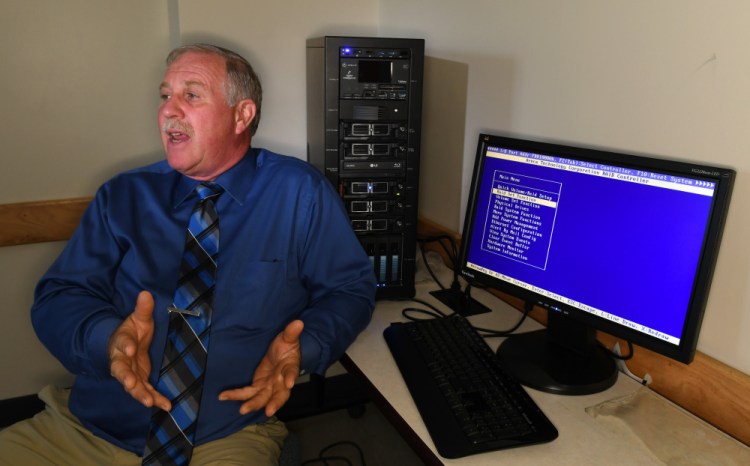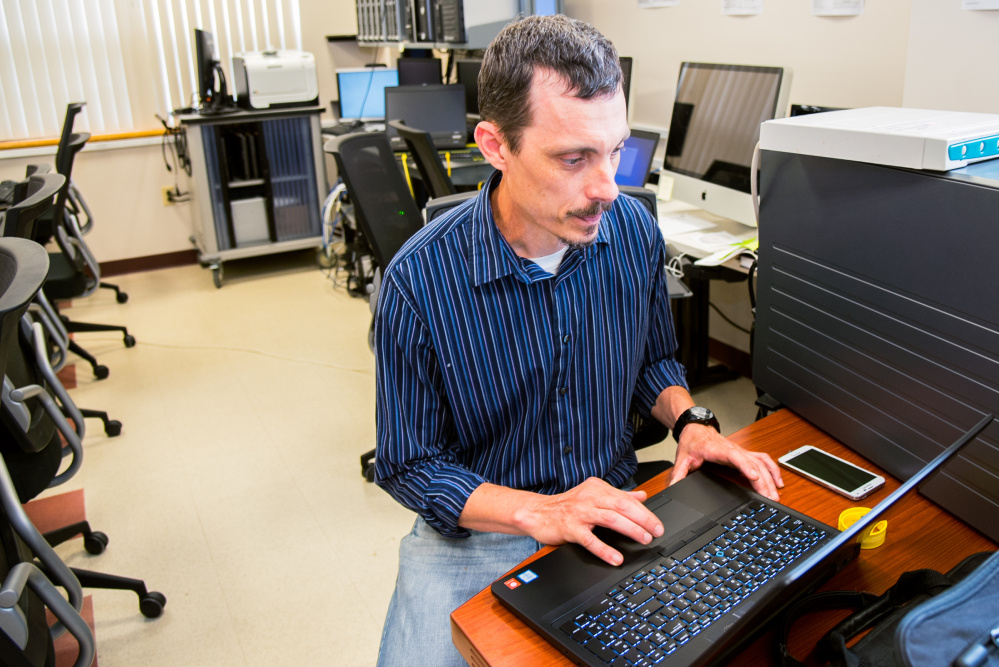AUGUSTA — When he was growing up on a farm in northern Maine, Henry Felch didn’t envision going to college, let alone ultimately becoming a college professor, in a discipline that didn’t even exist when he was a student.
Fast-forward 43 years, and the retired Army veteran is about to begin his third year leading the University of Maine at Augusta’s cybersecurity program, the first system-collaborated program recognized as a Center of Academic Excellence in Information Assurance/Cyber Defense by the National Security Agency.
“We came up with a plan (a few years ago) that was approved by the state system and we hit the ground running,” Felch said in front a computer screen in the school’s new cybersecurity laboratory on the second floor of the Randall Student Center. “We had the courses developed and had the program laid out.”
Right from the start, more than 60 students enrolled in the program, he said.
The field of cybersecurity, given constant media reports of hacking and data breaches and leaks, is growing at a rapid rate. According to the U.S. Bureau of Labor Statistics, there is a zero percent unemployment rate in the cybersecurity field, and the agency estimates about 1.5 million cybersecurity job openings by 2019. There aren’t enough programs and aren’t enough students in this country to fill the need, Felch said.
“The need for an educated workforce in this field is great in central Maine as well as nationally,” UMA Provost Joseph Szakas said. “As UMA is the largest producer of (information technology) graduates in the state, cybersecurity is a perfect fit for UMA’s commitment to (science, technology, engineering, and mathematics) education and preparing students for jobs of today and the future.”
Marc Weymouth, a senior, said cybersecurity is such a growing field because of all the devices connected to the internet and all the information being stored.
“All this information needs to be protected, and there are on average 329,000 malicious programs released a day,” he said. “The need for highly trained personnel in cybersecurity is great.”
Students enrolled in UMA’s program, which Felch say range from traditional age college students to older adults switching careers, learn about threat and security analysis, cybersecurity policy, intelligence, security analysis, information assurance, digital forensics and cyberdefense, among many others.
Robert Thompson, 44, was looking to change careers after spending 18 years as a carpenter and saw that the cybersecurity industry was growing at “an alarming rate.” He said he’s always liked computers and realized this was where the world was heading, so he wanted to get in.
“It seemed exciting because it was an emerging and fast-changing profession,” Thompson said. “But being (my age) with no prior programming or network administration knowledge, I was nervous and concerned I might not cut it.”
However, with hard work and the help of other students and the staff, plus what he’s learning during his internship at the University of Southern Maine, Thompson said he is confident he’ll have the skills, knowledge and expertise to be a benefit to the industry.
On campus, there are dozens of computers, systems and networks to practice with and work on, including FRED, the school’s Forensic Recovery of Evidence Device. It’s a large tower with slots for multiple hard drives, networking cards and data points that students use to learn how to recover digitally evidence that can be used to prosecute cyber criminals.
“Forensics isn’t just about prosecution, but it’s also about asking how somebody got in, what broke down and what can be done to prevent it from happening again,” Felch said. “You’ve got to make sure you go through the correct procedure so that (the case) will hold up in court.”
The UMA program started in the fall of 2015. About 140 students are enrolled it. Felch teaches classes in front of a smaller number of students in the Augusta campus’s cyber laboratory, but his lectures are available online to students at the Bangor campus, at university centers and across Maine.
Cybersecurity graduates can expect to earn six-figure salaries early in their careers working in the private sector, and government jobs are available at several agencies, including the CIA, the FBI, the National Security Agency and the Department of Homeland Security.
Felch said it’s important to continue to grow the programs in Maine and to educate students, business owners and corporations about the importance of cybersecurity. It’s especially important that the state retain those students who go on to become cybersecurity experts and leaders, rather than lose them to other states.
“A lot of our talent is going to leave the state simply because of how much more money you can make elsewhere,” he said.
Thompson, though, said he is thinking about staying in Maine and working to make it a safer and more secure place to live.
Felch said any business that has a website, takes online orders or uses credit cards and stores customer information needs to make sure systems are secure.
In recent years, Shaw’s supermarkets, Home Depot and Target were hacked and their financial systems were breached, compromising the personal information of millions of customers. Sometimes it takes months or years to detect a breach, Felch said, and having additional people working in the field could cut down on some of that.
“It’s also a lack of education of the users, because in cybersecurity, I have to figure out all the possible ways someone can attack,” he said. “A hacker has only got to find one way in, and sometimes there’s one idiot in a corporation willing to give up their password. It’s social engineering.”
Deputy Chief Jared Mills, of the Augusta Police Department, said the department’s information technology staff does a good job staying informed of threats and disseminating information to use securely.
“All our technology is up-to-date, to include internal checks and balances,” he said. “I would speculate that most departments throughout Maine are the same.”
Weymouth, 49, said he has a medical background and would like to get hired by a local hospital to test their security systems for weakness and to protect all the information they need to store. He’s also interested in computer forensics.
“Having the knowledge to search through an electronic device and find information that has been hidden or thought to be erased intrigues me,” Weymouth said. “Knowing that any information I find could help solve a criminal case is fascinating.”
Szakas said having a cybersecurity program doesn’t just enhance the students enrolled; it also helps promote the institution and raise its profile nationally.
“As UMA continues to expand in the field of information technology, the cybersecurity program positions UMA well for future grant opportunities and other IT related programs to leverage big data such as data science and virtual reality,” he said.
Jason Pafundi — 621-5663
Twitter: @jasonpafundiKJ
Send questions/comments to the editors.





Comments are no longer available on this story